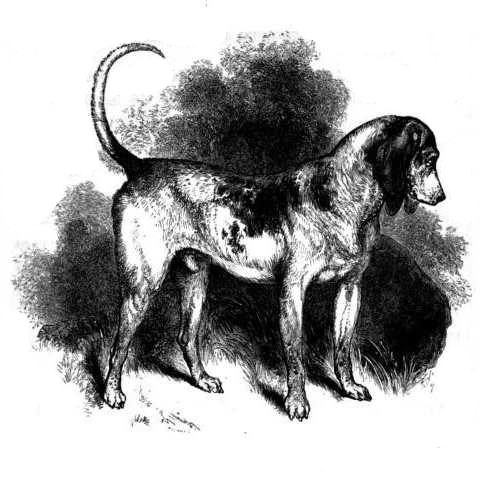As the two friends parted ways, Ganem did not allow his second thoughts or worries to stop him. He desperately wanted the happiness the inscription promised to give whomever solved the task. Even more importantly, though, he
had to know if the inscription was real. Even if his friend Salem's intuition was right that it was fake, he could not live with the not knowing. He decided that whatever happened to him, it would be worth the risk. Besides, he could not bare the idea of running to catch up with Salem and admit that he was probably right. And how hard could it be to cross the stream and carry the lion statue up the mountain?
With his mind made up, Ganem plunged into the stream to accomplish the first part of the inscription's task.
As soon as he dove, he knew he had made the wrong decision. It was much deeper than he had expected, and the whirlpool drew him in forcibly. Ganem was no match for the strong rotations, no matter how hard he fought them. He tried to yell out on instinct, but the water choked him. He splashed and gasped for air but was ultimately taken over by the current.
Everything went black.
~
Ganem, drenched, woke up wheezing and coughing up water. A voice that sounded far away in Ganem's hazy mind cried, "You idiot! What did I tell you?"
Ganem's sight finally came into focus and he saw Salem, also drenched, hovering over him. He realized they were on the bank of the stream, probably half a mile away from where he jumped in. He sat up and grunted at his friend.
"You did
not need to come back," Ganem said. "I was fine."
Salem sputtered unintelligibly and rolled his eyes. "Fine?" he said. "You call
this," he motioned to Ganem's current state, "
fine? You would have died!"
Ganem rolled his eyes at the dramatics, but his flushed face showed a hint of gratitude for the rescue his friend had provided. He really
could have died, he thought. Maybe it was time to reconsider his stubborn attitude. But just because he couldn't make it across the stream doesn't mean that nobody else could . . .
Ganem stood, dusted himself off, and started walking back to the stone that held the inscription.
"What--where are you going?" Salem asked, dumbfounded. "You--you're not thinking about going back and trying that
again?"
Ganem grunted and continued walking.
Salem groaned. "Don't think that I'm going to save you again!"
Ganem kept walking. Salem made an exasperated noise. A few seconds later, Ganem could hear Salem running up behind him. "Okay, fine! We'll do it together." Then with frustration but affection he said, "You obstinate idiot." The corner of Ganem's mouth pulled into a smile as they continued to trek onwards.
They worked together to finish the task. They crossed the stream together, working strategically to get past the whirlpool. They carried the lion statue to the top of the mountain in one, long run. They sweat in copious amounts and their muscles ached. When one felt like giving up, the other offered a shoulder to lean on.
At the mountaintop, Salem was not shocked to see that there was nothing waiting for them. The inscription was fake, and he had known it all along. Ganem had not seemed shocked either, as his confidence had been wavering the further into the adventure they had gotten.
Still, there was a hint of hope in both of them during the journey they had put themselves through. The hope and having each other had gotten them through it. Ganem's disappointment was immense and it showed on his face. He sat on the dirt-covered ground, picking at grass and fixing his concentration on the lion statue they had carried all that way. He refused to look at Salem.
"Whoever inscribed that has got a lot of nerve," Salem said, trying to cheer his friend up. "Who does something like that?"
Ganem, frowning, continued to stare at the lion statue.
Offering a hand to his friend, Salem said, "I heard there's a village a mile away from here with the best lamb dish on Earth."
Ganem heaved a great sigh. He then looked at Salem, smiled, and said, "We better get going, then." He took his friend's hand to hoist himself up and off they went to the next adventure.
+++
Author's Note: I altered the story of "
The Two Travelers" to include more of Ganem and Salem's relationship. I also changed the ending.
The original story is about two men, Ganem and Salem, who are traveling together. They come across an inscription on a stone that said that "great happiness" will be given to whomever could do the brutal task listed. Ganem believes it, but Salem is worried that it is just the writing of a beggar who is trying to trick people. Salem leaves but Ganem goes on to follow through with the task and ends up as the king of the city that inscribed the message.
As for my own version, I saw that there was a lot lacking in the writing of Ganem and Salem's friendship that I wanted to read about. I wanted to see Salem go back for his friend because that just seemed like what his character would do. Ganem seemed pretty stubborn (at one point in the original story he said, "My mind is fully made up to try it") so I ended up making that a big part of the story. I've been wanting to practice
character-driven stories where the character interactions are more important than the plot. Ganem and Salem's friendship seemed like the perfect opportunity for that. I then also changed the ending to create a story that centers more around the journey than the ending. Even if it's unfortunate that they did all of that for nothing, they at least bonded over the experience.
Image information:
Whirlpool from Wikimedia Commons
Bibliography:
The Two Travelers from the
Bidpai unit. Story source:
The Tortoise and the Geese and Other Fables of Bidpai by Maude Barrows Dutton, with illustrations by E. Boyd Smith, 1908.













.png)














